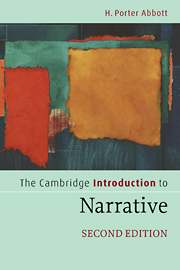Book contents
- Frontmatter
- Contents
- List of illustrations
- Preface
- Preface to the second edition
- Acknowledgments
- Chapter 1 Narrative and life
- Chapter 2 Defining narrative
- Chapter 3 The borders of narrative
- Chapter 4 The rhetoric of narrative
- Chapter 5 Closure
- Chapter 6 Narration
- Chapter 7 Interpreting narrative
- Chapter 8 Three ways to interpret narrative
- Chapter 9 Adaptation across media
- Chapter 10 Character and self in narrative
- Chapter 11 Narrative and truth
- Chapter 12 Narrative worlds
- Chapter 13 Narrative contestation
- Chapter 14 Narrative negotiation
- Notes
- Bibliography
- Glossary and topical index
- Index of authors and narratives
Chapter 6 - Narration
- Frontmatter
- Contents
- List of illustrations
- Preface
- Preface to the second edition
- Acknowledgments
- Chapter 1 Narrative and life
- Chapter 2 Defining narrative
- Chapter 3 The borders of narrative
- Chapter 4 The rhetoric of narrative
- Chapter 5 Closure
- Chapter 6 Narration
- Chapter 7 Interpreting narrative
- Chapter 8 Three ways to interpret narrative
- Chapter 9 Adaptation across media
- Chapter 10 Character and self in narrative
- Chapter 11 Narrative and truth
- Chapter 12 Narrative worlds
- Chapter 13 Narrative contestation
- Chapter 14 Narrative negotiation
- Notes
- Bibliography
- Glossary and topical index
- Index of authors and narratives
Summary
A few words on interpretation
We have all had the experience of arguing about the meaning or meanings of a narrative. In other words, we have argued about how to interpret the narrative. “Meaning” is yet another debatable term in this field, but in general we think of meaning as having to do with ideas and judgments. Do narratives have meaning in this sense? Do they communicate ideas and produce judgments? There are some who would say: No, a story is just a story and a narrative is just a narrative, just as a picture is just a picture and a song just a song. But this is a pretty hard position to maintain. To begin with, it is very hard not to take notice of the ideas that come up everywhere during the course of a narrative. As one reads, say, The Brothers Karamazov, it is very hard not to become engaged in the debate on the ethics of killing. As to the question of whether or not narratives actually arrive at judgments – that is, arrive at closure on the level of intellectual and moral questions – the answer is: some seem to and some don't. Certainly, narratives that are satire or propaganda or advertising make judgments, some of them with hammer blows. But we have also just been acknowledging that many narratives refrain from closing at the level of questions.
- Type
- Chapter
- Information
- The Cambridge Introduction to Narrative , pp. 67 - 82Publisher: Cambridge University PressPrint publication year: 2008



